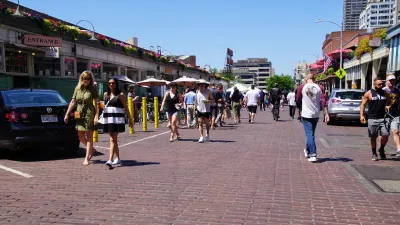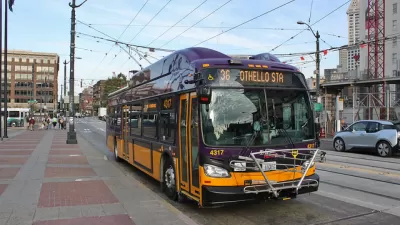According to one local writer, the city’s low rate of car ownership should encourage officials to support public transit and reduce parking minimums.

Over 20 percent of Seattle households do not own a car, according to a report from the Seattle Times. According to Seattle Bike Blog’s Tom Fucoloro, this signals that the city should be investing in transit and eliminating parking requirements that drive up the cost of housing.
Fucoloro notes that “The car-free households tend to be concentrated in dense neighborhoods with quality transit service like Capitol Hill, downtown and especially the U District and the International District.” But too many Seattle transit lines end service early in the day, and many trails lack nighttime lighting.
Fucoloro also suggests thinking outside the urban box and vastly expanding programs such as King County Metro’s Trailhead Direct, which helps people access outdoor recreation opportunities without a car. “Expanding rural transit across the state will not only provide service to people who live in those communities, but it will also help the increasing number of car-free residents access more places.”
FULL STORY: Balk: Car ownership keeps dropping in Seattle

Study: Maui’s Plan to Convert Vacation Rentals to Long-Term Housing Could Cause Nearly $1 Billion Economic Loss
The plan would reduce visitor accommodation by 25,% resulting in 1,900 jobs lost.

Alabama: Trump Terminates Settlements for Black Communities Harmed By Raw Sewage
Trump deemed the landmark civil rights agreement “illegal DEI and environmental justice policy.”

North Texas Transit Leaders Tout Benefits of TOD for Growing Region
At a summit focused on transit-oriented development, policymakers discussed how North Texas’ expanded light rail system can serve as a tool for economic growth.

Paris Bike Boom Leads to Steep Drop in Air Pollution
The French city’s air quality has improved dramatically in the past 20 years, coinciding with a growth in cycling.

Why Housing Costs More to Build in California Than in Texas
Hard costs like labor and materials combined with ‘soft’ costs such as permitting make building in the San Francisco Bay Area almost three times as costly as in Texas cities.

San Diego County Sees a Rise in Urban Coyotes
San Diego County experiences a rise in urban coyotes, as sightings become prevalent throughout its urban neighbourhoods and surrounding areas.
Urban Design for Planners 1: Software Tools
This six-course series explores essential urban design concepts using open source software and equips planners with the tools they need to participate fully in the urban design process.
Planning for Universal Design
Learn the tools for implementing Universal Design in planning regulations.
Smith Gee Studio
Alamo Area Metropolitan Planning Organization
City of Santa Clarita
Institute for Housing and Urban Development Studies (IHS)
City of Grandview
Harvard GSD Executive Education
Toledo-Lucas County Plan Commissions
Salt Lake City
NYU Wagner Graduate School of Public Service




























